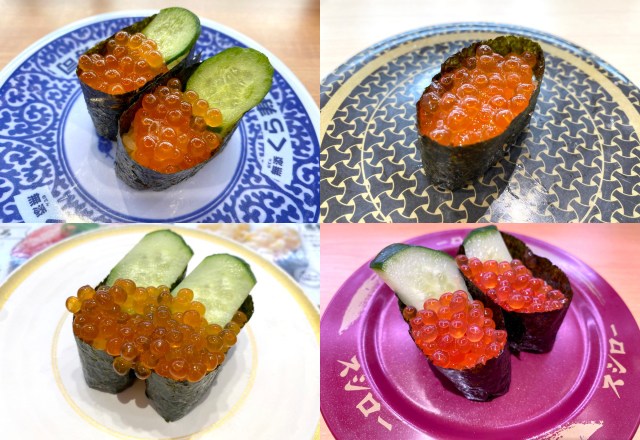
We go round Japan’s top kaitenzushi chains to find the best place to go for salmon roe.
After sampling all the steamed buns at Japan’s most popular convenience stores, our Japanese-language reporter P.K. Sanjun is on a new culinary mission: to sample the sushi at Japan’s most popular conveyor belt sushi restaurants.
The big four conveyor belt sushi restaurants, or “kaitenzushi” restaurants as they’re known in Japan, are: Kappa Sushi (a.k.a “Kappa Zushi”), Kura Sushi (a.k.a “Kurazushi”), Sushiro, and Hama Sushi (a.k.a “Hamazushi”).
▼ Clockwise from top left: Kappa Sushi, Kura Sushi, Sushiro, and Hama Sushi
After trying out the chains’ maguro tuna offerings last week, P.K. was now keen to compare another popular sushi dish: ikura (salmon roe).
▼ Clockwise from top left: Kappa Sushi, Kura Sushi, Sushiro, and Hama Sushi
To give us the most accurate evaluation, P.K. visited all four restaurants on the same day, so let’s find out which ones floated his boat…and which ones didn’t.
● Kappa Sushi (165 yen [$US1.43])
First up to the tasting plate is Kappa Sushi’s offering, which contained a good serving of ikura, along with a slice of cucumber in each morsel. While it looked nice on the plate, it didn’t really stand out on the palate, with the cucumbers detracting from the overall flavour rather than enhancing it, making for a mellow flavour and so-so finish.
● Kura Sushi (110 yen)
Next up was the ikura from Kura Sushi, which needs to be applauded for its price point, coming in at 55 yen cheaper than all the others in this taste test. Understandably, it was a little smaller than the others, but what you get for the price is actually really good – a fresh cucumber slice in each, and some lovely, glistening balls of roe. The taste wasn’t anything to shout about from the rooftops, but it was a good, solid offering.
● Hama Sushi (165 yen)
Hama Sushi’s ikura surprised P.K. with its solo-serve offering. However, when he tasted it, he understood why the single morsel didn’t need a partner on the plate, as it packed in the same level of taste satisfaction in one piece as the two-piece varieties did at the other chains.
The salmon roe here was incredibly delicious, and P.K. likened the difference between this one and the others to the difference between professional baseball and high school baseball.
● Sushiro (165 yen)
The final stop of the day was at Sushiro, where P.K. was again greeted by a glistening cucumber-and-ikura duo. This one looked a little rougher than the others, though, with the cucumber sliced rather haphazardly. This tipped the balance of flavours off the mark, as the cucumber ended up overwhelming the more subtle taste of ikura.
So, at the end of his kaitenzushi tour, P.K. gave the top accolade to Hama Sushi for its superb, pro-baseball quality ikura offering. They smashed it out of the park with their single sushi, showing a confidence and expertise way above its field of competitors, and it left P.K. wondering if all ikura sushi might be better off without its popular cucumber companion.
▼ P.K. did also want to give an honorary mention to Kura Sushi’s ikura, as its 110-yen offering was great value for money.
These four chains certainly put up a good fight, and on an empty stomach P.K. wouldn’t refuse any of them. However, when he’s got a hankering for ikura, he’ll be heading back to Hama Sushi in a heartbeat.
As for their sushi crepes in Harajuku…well, that’s another story.
Photos © SoraNews24
● Want to hear about SoraNews24’s latest articles as soon as they’re published? Follow us on Facebook and Twitter!
[ Read in Japanese ]

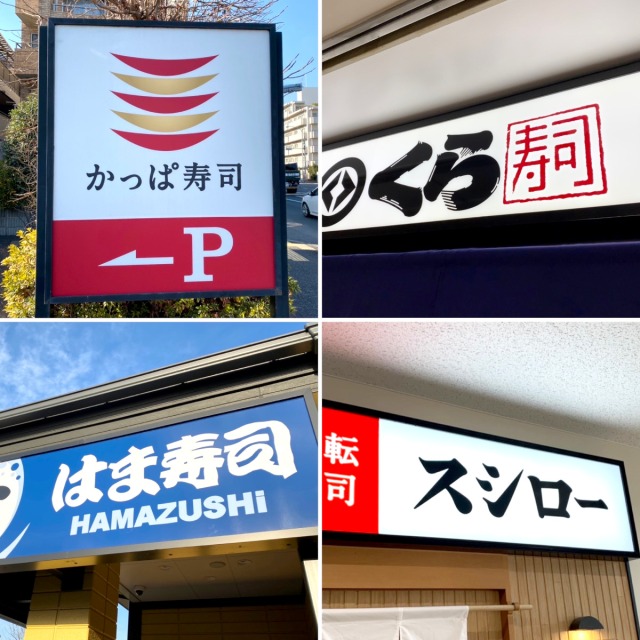
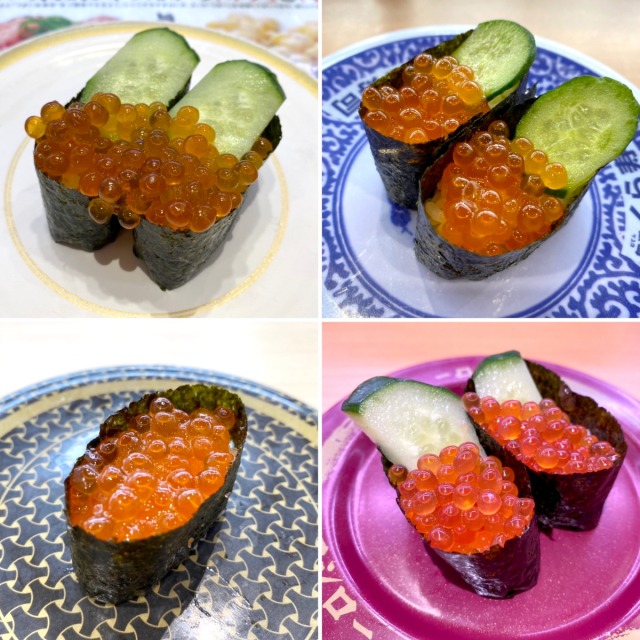
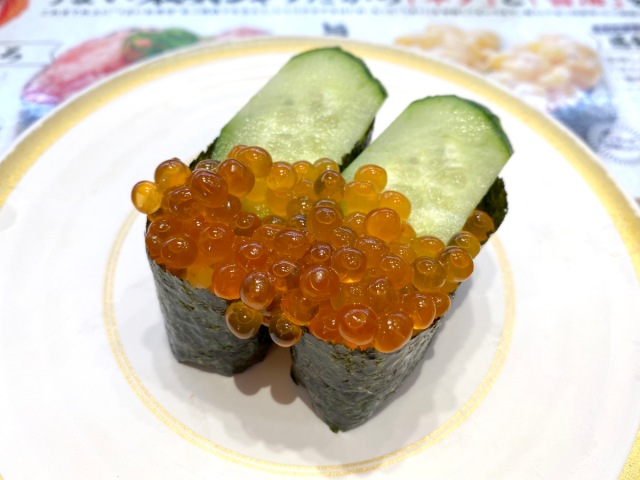
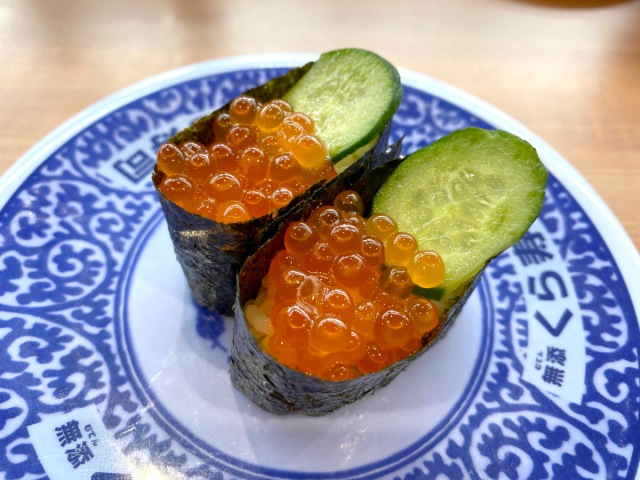
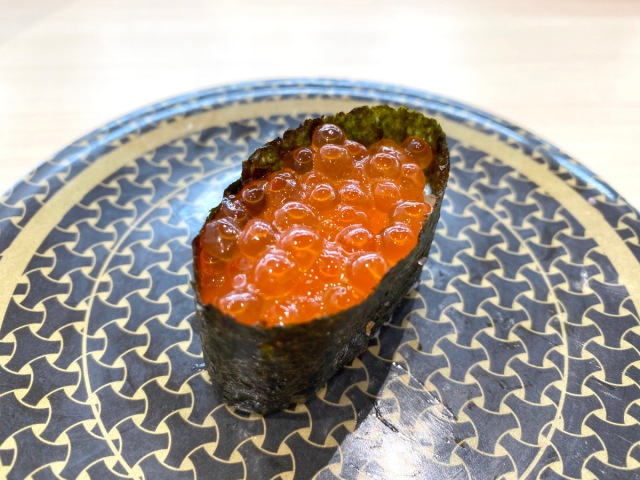
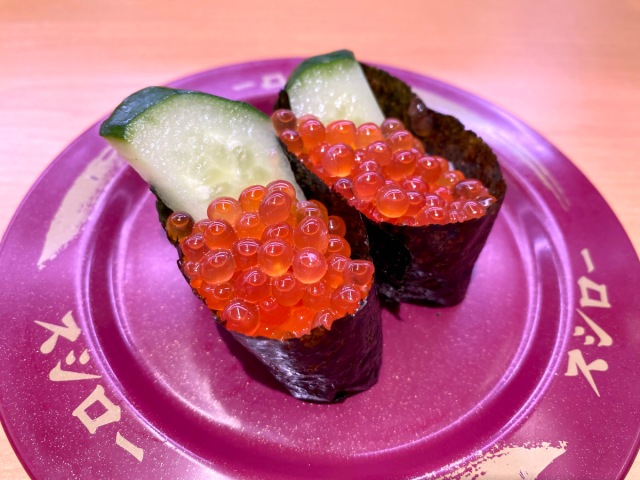

 Which Japanese conveyor belt sushi chain has the best salmon sushi?【Taste test】
Which Japanese conveyor belt sushi chain has the best salmon sushi?【Taste test】 Which Japanese conveyor belt sushi chain has the best saltwater eel sushi?【Taste test】
Which Japanese conveyor belt sushi chain has the best saltwater eel sushi?【Taste test】 Which Japanese conveyor belt sushi chain has the best tuna sushi?【Taste test】
Which Japanese conveyor belt sushi chain has the best tuna sushi?【Taste test】 Which Japanese conveyor belt sushi chain has the best squid sushi?【Taste test】
Which Japanese conveyor belt sushi chain has the best squid sushi?【Taste test】 Which Japanese conveyor belt sushi chain has the best egg sushi?【Taste test】
Which Japanese conveyor belt sushi chain has the best egg sushi?【Taste test】 Japan Extreme Budget Travel! A trip from Tokyo to Izumo for just 30,000 yen [Part 2]
Japan Extreme Budget Travel! A trip from Tokyo to Izumo for just 30,000 yen [Part 2] Japanese restaurant chain serves Dragon Ball donuts and Senzu Beans this spring
Japanese restaurant chain serves Dragon Ball donuts and Senzu Beans this spring Which convenience store onigiri rice balls are the most popular? Survey reveals surprising results
Which convenience store onigiri rice balls are the most popular? Survey reveals surprising results Tokyo street sweets: The must-snack treats of Nakano’s Refutei
Tokyo street sweets: The must-snack treats of Nakano’s Refutei Japan has only one airport named after a samurai, so let’s check out Kochi Ryoma【Photos】
Japan has only one airport named after a samurai, so let’s check out Kochi Ryoma【Photos】 New interactive Pokémon attraction coming to Universal Studios Japan
New interactive Pokémon attraction coming to Universal Studios Japan Miss World Japan: The great-times-20-granddaughter of samurai lord One-Eyed Dragon
Miss World Japan: The great-times-20-granddaughter of samurai lord One-Eyed Dragon Foreign tourists in Japan will get free Shinkansen tickets to promote regional tourism
Foreign tourists in Japan will get free Shinkansen tickets to promote regional tourism How to get all-you-can eat doughnuts at Mister Donut for just 12 bucks!
How to get all-you-can eat doughnuts at Mister Donut for just 12 bucks! Say hello to Japan’s new stationmaster cat!【Video】
Say hello to Japan’s new stationmaster cat!【Video】 The 10 most annoying things foreign tourists do on Japanese trains, according to locals
The 10 most annoying things foreign tourists do on Japanese trains, according to locals Highest Starbucks in Japan set to open this spring in the Tokyo sky
Highest Starbucks in Japan set to open this spring in the Tokyo sky Tokyo Skytree turns pink for the cherry blossom season
Tokyo Skytree turns pink for the cherry blossom season Starbucks Japan releases new sakura goods and drinkware for cherry blossom season 2026
Starbucks Japan releases new sakura goods and drinkware for cherry blossom season 2026 Japan’s new “Cunte” contact lenses aren’t pronounced like you’re probably thinking they are
Japan’s new “Cunte” contact lenses aren’t pronounced like you’re probably thinking they are Shibuya Station’s Hachiko Gate and Yamanote Line stairway locations change next month
Shibuya Station’s Hachiko Gate and Yamanote Line stairway locations change next month Yakuzen ramen restaurant in Tokyo is very different to a yakuza ramen restaurant
Yakuzen ramen restaurant in Tokyo is very different to a yakuza ramen restaurant Starbucks Japan adds new sakura Frappuccino and cherry blossom drinks to the menu
Starbucks Japan adds new sakura Frappuccino and cherry blossom drinks to the menu Japan just had its first same-month foreign tourist decrease in four years
Japan just had its first same-month foreign tourist decrease in four years Burning through cash just to throw things away tops list of headaches when moving house in Japan
Burning through cash just to throw things away tops list of headaches when moving house in Japan Japan’s newest Shinkansen has no seats…or passengers [Video]
Japan’s newest Shinkansen has no seats…or passengers [Video] Foreigners accounting for over 80 percent of off-course skiers needing rescue in Japan’s Hokkaido
Foreigners accounting for over 80 percent of off-course skiers needing rescue in Japan’s Hokkaido Super-salty pizza sends six kids to the hospital in Japan, linguistics blamed
Super-salty pizza sends six kids to the hospital in Japan, linguistics blamed Starbucks Japan unveils new sakura Frappuccino for cherry blossom season 2026
Starbucks Japan unveils new sakura Frappuccino for cherry blossom season 2026 Take a trip to Japan’s Dododo Land, the most irritating place on Earth
Take a trip to Japan’s Dododo Land, the most irritating place on Earth Naruto and Converse team up for new line of shinobi sneakers[Photos]
Naruto and Converse team up for new line of shinobi sneakers[Photos] Is China’s don’t-go-to-Japan warning affecting the lines at a popular Tokyo gyukatsu restaurant?
Is China’s don’t-go-to-Japan warning affecting the lines at a popular Tokyo gyukatsu restaurant? Survey asks foreign tourists what bothered them in Japan, more than half gave same answer
Survey asks foreign tourists what bothered them in Japan, more than half gave same answer Japan’s human washing machines will go on sale to general public, demos to be held in Tokyo
Japan’s human washing machines will go on sale to general public, demos to be held in Tokyo Starbucks Japan releases new drinkware and goods for Valentine’s Day
Starbucks Japan releases new drinkware and goods for Valentine’s Day We deeply regret going into this tunnel on our walk in the mountains of Japan
We deeply regret going into this tunnel on our walk in the mountains of Japan Studio Ghibli releases Kodama forest spirits from Princess Mononoke to light up your home
Studio Ghibli releases Kodama forest spirits from Princess Mononoke to light up your home Major Japanese hotel chain says reservations via overseas booking sites may not be valid
Major Japanese hotel chain says reservations via overseas booking sites may not be valid Put sesame oil in your coffee? Japanese maker says it’s the best way to start your day【Taste test】
Put sesame oil in your coffee? Japanese maker says it’s the best way to start your day【Taste test】 No more using real katana for tourism activities, Japan’s National Police Agency says
No more using real katana for tourism activities, Japan’s National Police Agency says Which Japanese conveyor belt sushi chain has the best scallop sushi?【Taste test】
Which Japanese conveyor belt sushi chain has the best scallop sushi?【Taste test】 Which Japanese conveyor belt sushi chain has the best aosa miso soup?【Taste test】
Which Japanese conveyor belt sushi chain has the best aosa miso soup?【Taste test】 Which Japanese conveyor belt sushi chain has the best aburi salmon sushi?【Taste test】
Which Japanese conveyor belt sushi chain has the best aburi salmon sushi?【Taste test】 Which Japanese conveyor belt sushi chain has the best bintoro sushi?【Taste test】
Which Japanese conveyor belt sushi chain has the best bintoro sushi?【Taste test】 Which Japanese conveyor belt sushi chain has the best salad sushi?【Taste test】
Which Japanese conveyor belt sushi chain has the best salad sushi?【Taste test】 Which Japanese conveyor belt sushi chain has the best iwashi sardine sushi?【Taste test】
Which Japanese conveyor belt sushi chain has the best iwashi sardine sushi?【Taste test】 Which Japanese conveyor belt sushi chain has the best negitoro sushi?【Taste test】
Which Japanese conveyor belt sushi chain has the best negitoro sushi?【Taste test】 Which Japanese conveyor belt sushi chain has the best yellowtail sushi?【Taste test】
Which Japanese conveyor belt sushi chain has the best yellowtail sushi?【Taste test】 Which Japanese conveyer belt sushi chain has the best chutoro?【Taste test】
Which Japanese conveyer belt sushi chain has the best chutoro?【Taste test】 Which Japanese conveyor belt sushi chain has the best prawn sushi?【Taste test】
Which Japanese conveyor belt sushi chain has the best prawn sushi?【Taste test】 Which Japanese conveyer belt sushi chain has the best steamed egg custard? 【Taste test】
Which Japanese conveyer belt sushi chain has the best steamed egg custard? 【Taste test】 Which Japanese conveyor belt sushi chain has the best tai sushi?【Taste test】
Which Japanese conveyor belt sushi chain has the best tai sushi?【Taste test】 Which Japanese conveyor belt sushi chain has the best hamburger steak sushi?【Taste test】
Which Japanese conveyor belt sushi chain has the best hamburger steak sushi?【Taste test】 Which Japanese conveyor belt sushi chain has the best mackerel sushi?【Taste test】
Which Japanese conveyor belt sushi chain has the best mackerel sushi?【Taste test】 Which Japanese conveyor belt sushi chain has the best Prawn Tempura Sushi?【Taste test】
Which Japanese conveyor belt sushi chain has the best Prawn Tempura Sushi?【Taste test】 Is it the end of Japan’s conveyor belt sushi as we know it?
Is it the end of Japan’s conveyor belt sushi as we know it?